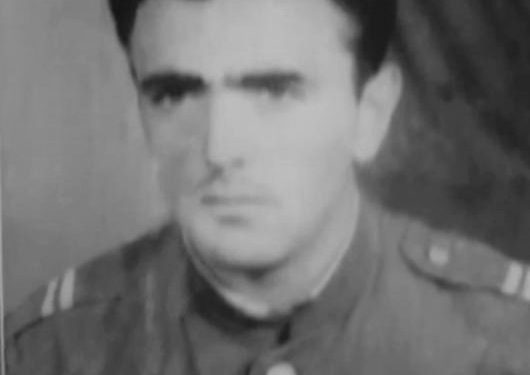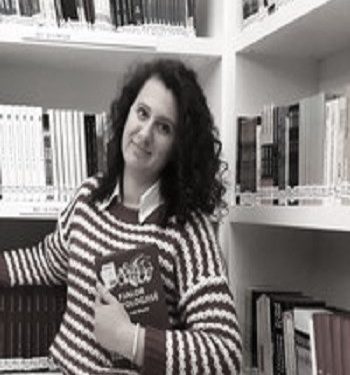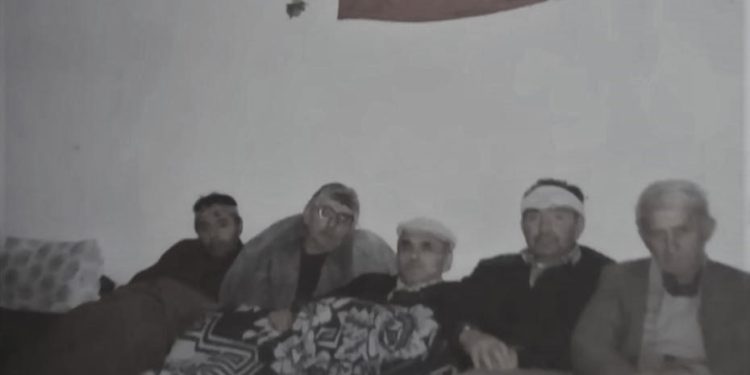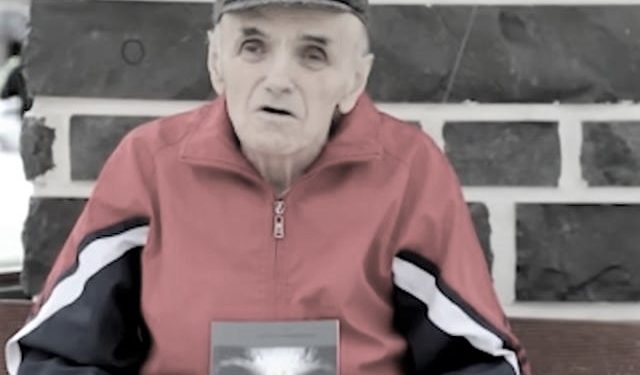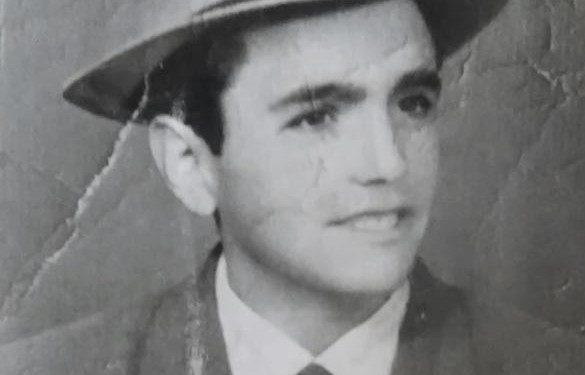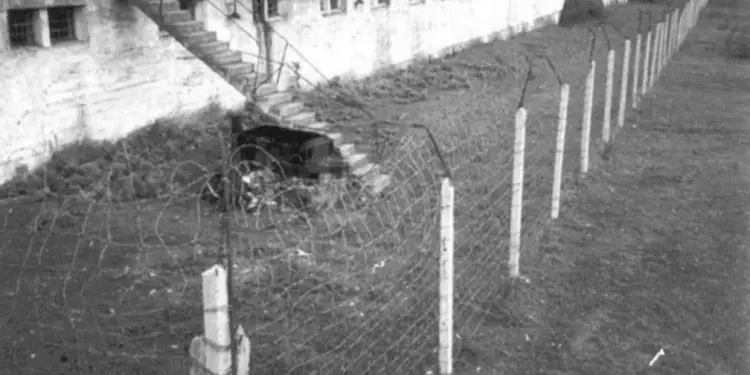By Najada Pendavinji
Memorie.al / Urim Elezi, is one of the survivors of communist crimes and one of the witnesses of that time, who through suffering, best shows the true face of the communist dictatorship of Enver Hoxha and his successor, Ramiz Alia. With memories of torture, fear, despair, denial of rights and loss of reason, it testifies to the brutality that happened inside the prison walls. He was born in 1943, in Floq of the city of Korça, but his origin is from the Elezets of Tropoja. At the age of 18, he completed the school of instruction in Gjirokastra, where he was promoted to non-commissioned officer. The ordeal of his suffering begins at the age of 21, as a result of the attempt to escape from communist Albania. Urim Elezi has experienced the persecution system since 1963, being sentenced to 26 years in prison. He went through several communist prisons, until he ended up in Burrel prison, where he experienced the most inhuman tortures, which would also cause him to lose his sight, sentencing him to life. Today he is 80 years old and is still suffering the consequences of that regime, which has crucified him in blindness, for the rest of his life…!
Mr. Elezi, what is the reason for your arrest?
The communist system was set up in such a way that anything that harmed and touched the state in the slightest would experience communist revenge, which was merciless. That happened to me too. At the age of 21, I thought that life in communist Albania could not be built freely.
Especially after 1961, when the relations of the Albanian state with the Soviet Union and the countries of the People’s Democracies began to malfunction. Our country was sinking into poverty and heading towards isolation, where the only way out was to escape across the border. So, the reason for my arrest was attempted escape abroad, remaining in the attempted stage.
How was the escape day? Have you been thinking about it for a while?
I had already heard stories about my fellow villagers escaping and running away from communist Albania. During that time, I was a non-commissioned officer in a military unit of Gjirokastra, together with my friend, Hekuran Shyti, who was a guard of the Bulga command.
We stayed in the army for almost 2 years, where the situation there became very boring and unbearable for us, the food in the ward was very bad, our clothes were made with patches. And as a result, after many talks, where the key word was “you don’t live here”, with Hekuran Shyti, we decided to run away, where the destination was America, I to my uncle Alizoti, he to his uncle.
We had thought that we would go for only 11-12 years to work there and return to get married here. Hekurani had also discussed this with a friend of his, Bexheti, and two others from Korça, whose names I do not remember.
We tried to escape from the ward, but we both found no way to escape, as I was in the artillery headquarters platoon, a surveyor, while he was in liaison, and we were also surrounded by many soldiers, officers and non-commissioned officers.
Today, tomorrow, obstacles appeared, Hekurani was released a year before me, in 1962. But when he ran away, we left a way to communicate because, from there, we had doubts that we might have fallen into the “mouths” of the Security State.
At this time, on October 22, 1963, Hekurani calls me and tells me that; one from safety, (under a pseudonym of course), is not leaving me and don’t forget the movie “Xhemileja”, that is, don’t run away, because if you run away, I will be tortured, to tell him the plan.
We saw this movie together in the summer cinema in Gjirokastër, what torture made her tell! In conclusion, he sends me a telegram in the name of my brother, Festim, where he allegedly wrote that: “mother is seriously ill with a heart attack in the hospital, if you can, get emergency leave and come”.
He sent the same telegram to me and the command. Thus, Commissioner Fitim Balili gave me permission for almost 5 days, but I could not leave that day, as there was no car. At 22:00 on October 24, 1963, I arrived in Korça.
The first one I met was Durim Shyti, who tells me that we fell under the scent of the Security hounds, Hekurani tells me the same thing, so the sooner we escape, the better it will be. The four of us set off: me, Hekurani, Roberti, and Durimi from Korça, where on the way, a windy snow began that did not allow us to walk and we lost the thread of the journey altogether. When it dawned, we realized that we were still on our land, our bodies shuddered. In front of us, about 500 m. in a straight line was the Greek post office.
We had passed near it and they had spied on us, the son from Kamenica, Shabani and Esati. So he, together with the commander and a couple of others, surrounded us. This is where the torture began, merciless violence, where they broke the chairs on our backs, hitting us with iron whips. I would pass out from the torture and when I woke up; I could hear the moans of my friends from other rooms. I could hear Hekuran’s voice: “O mother, O mother”!
At this moment, I say: “Aman, don’t torture us anymore, kill me better.” We will sign whatever you want even if we would escape, but just don’t torture us”. We signed the letter, but the torture did not stop. From there they took us to the Internal Branch here in Korça, where they pushed us and put us in a room with civilians, military and police, two of them I knew, the civilian Petro Tasellari from Korça and the major, Ago Sina from Vlora.
Do you remember the names of your interrogators and those who sentenced you?
From the Branch, I was taken to the interrogator, where the torture was just coming and increasing. My hands were chained behind my back. In the room where they stabbed me, there were about 5-6 people, I knew only two of them, as I said a little before, the head of the Investigation, Petro Tasellari and Major Ago Sina. The latter tells me: “We will extract your mother’s milk here, but tell us how many other friends you talked to, to escape”?!
The questions were among the most incomprehensible, they were provocations from the most diverse, which if you did not answer as they wanted, you would experience physical and psychological torture. From that day and up to 3 months that I stayed in the interrogator, the tortures did not stop. I remember that Ago Sino forced me by hitting me to say “even the donkey flies”!
At this moment, they put my head in the water, it was like a dishwasher, it’s an iron room there, I remember that there were 4-5 people who were immersing me, and on one arm, I had Ago Sina, lying as I was, I didn’t I never forget, on my right cheek, I feel the sole of his big foot, which was hitting me.
But not only did I say it, I also had to sign it, they gave me a grass-colored pen, right in the middle of the torture I signed it, not really knowing why they were asking for it. At this time, I see that Ago Sina with others who were dancing. Oh God, – I said to myself – where am I here?! The other investigator was Riza Shehu and the head of the Branch, Jani Naska.
When and how did the trial take place?
At 10:00 a.m. on February 26, 1964, the trial took place in Korça, which continued for almost two days. In the courtroom, there were our family members and the jury, and then all the witnesses came with their statements. The witnesses were the commander of the border post who arrested us, together with the soldiers, Esati and Shabani.
The chairman of the trial was Colonel Mit’hat Goskova. This is how we were convicted for the first time, for the crime of “treason against the motherland” by trying to escape to Greece. The court verdict came out on February 27, where I was sentenced to 20 years in prison.
Where did he serve his sentence?
After receiving the court decision, I was first taken to the old prison of Korça, for almost 1 month. In this prison, I got to know other prisoners who had the same sentence for escape attempts, but at a younger age, such as Nevruz Golka, Vasil and Janaq Tarusha.
Then they take us to the Superphosphate Factory in Laç to work, I might say, as slaves. From Laçi they took us to Elbasan, as the Cement Factory was going to be built, where I stayed for almost 1 year. Here I remember that the police made various provocations and one of them was Dushan from Tepelena, who also participated in the shooting of prisoners. From here, they take us to Fushë-Kruje, where I tried, not only the dungeon, bars, chains, but also the pool cue.
On June 7, 1967, we were sent to Burrel. From the outside, Burrell’s prison looks like a long underground tomb, but when you enter the courtyard, it is raised. The first presentation there makes you realize that, it is a long ordeal. As he enters the front, he sees a slogan written in red ink, which says: “Burrel, you enter and you don’t leave”.
This is how the control began, where the prisoners would stand apart from each other, no more than 5-6 meters. They stripped us and checked even the sewn clothes, this was the first entry. First, they took me to room no. 9, where outside the door, I saw 3-4 crutches. When I went inside, I see sick old people, all by the grave. I was terrified.
On the second day, the appeal is made and one of those commissioners called my name, Urim Elezi, and made me sit down and stand up 4-5 times. At this moment, I get angry and tell him: what you are doing is humiliating, put me in the dungeon, and put me in, where I stayed for 30 days. In the dungeon, we didn’t wear our own clothes, but what they left us: socks, pants and a striped meringue jacket.
We only had underwear and a v-shaped shirt. In the dungeons of Burrel, it was unbearably cold, the room where we stayed was 8 by 6 m. and there were almost 40 of us inside it.
We were taken out for airing every day except for the dungeon, almost 40 minutes and up to 1 hour, but of course during this time, they checked who we talked to and what we did. I remember that on the day when the news broke about Mehmet Shehu’s murder, we didn’t go out for airing for almost 3 months.
The food was little, 300 gr. bread and 900 gr. potatoes which were not put in the mouth because they were cooked at the end of the day when the kitchen was closed and served the next afternoon. Rotten hunger.
If you were to compare Spaç with Burrell, I can say that in Burrel you died of hunger, while in Spaç you didn’t suffer for food, but you died from hard work in the gallery. Here in Burrel, I stayed together with the late Pjetër Arbnori, who was truly a wonderful man, with Ruzhdi Kraja, from Shkodra, etc…!
What were the physical tortures that were most often used against you?
The tortures I experienced during that time were terrible as far as I can tell, indeed life was very compassionate, but before the tortures, death is much easier. The torture was endless, in the dungeon, I even remember when we were taken out to the bathroom, we were only taken out 3 times in 9 hours. And when we entered the bathroom, as soon as we sat down to perform our personal needs, they took us straight away.
At one point, I got angry with Ramadan Kurti, who was really provocative, and after a few seconds I was mentioned and saw that I was tied hand and foot in the bathroom, with my head inside the toilet. Terrible torture, it was the closet during the investigation, where between blows on every part of the body, to affirm about the escape, they tied my legs and hands with chains and put me in the closet, which had such dimensions that I was lying folded.
I stayed there for a full 6 hours, until they had enough to take me out. The policeman named Shaban Selami put wood in my mouth and tied me with his shoelace! Where the wood, it also broke my dentures.
When I went to Spaç, it happened to me out of great despair, I tried to jump into the abyss together with my friends, Kadri Thaçi, from Kukësi, Xhemal Spata, from Dibra and Çaush Çoku, from Lushnja.
What happened in the second investigation?
Almost 17 years passed in the prisons of the communist regime, but on the eve of the day of release, the “sons of the party” had not yet finished working with me. So the prison security operative, Gjergj Stefa, who was really a criminal and a man without morals, tied my hands with irons, put me in a car and took me to the Internal Branch of Fier.
There, a second investigation took place for me, where the investigator was Shkëlzen Barajktari, the district prosecutor of Fier, Zija Shahini, and Rapi Mino, the General Prosecutor of the Republic, were also present. I don’t know why I was sentenced, but the verdict was given “for agitation and propaganda”, in prison! 10 years imprisonment.
How did you experience the return to Burrell prison?
When I think of Burrell, I get goosebumps. When I returned to the room, out of 30 people, I only knew Adem Allçi. And later, other prisoners were brought to our room, such as: Mersin Vlashin, Rrok Bituku, Demir Pojanin and Gjergj Pečin.
After many provocations, on December 5, 1981, I wrote a letter to the cursed “Enver Hoxha”, where I told him: “Colorless monster, sick with persecution mania”.
I also read this letter to Mersin Vlashi and Rrok Bituku, who told me that he should also write a letter to him, as a man out of desperation is looking for ways to survive. At 16.00, we drop the letters in the mail.
At 7 o’clock in the morning, the appeal is made, at 8 o’clock the door of our cell opens and the policemen enter: Xhemal Varani, Met Varani, Ramazan Lika, and Abazi, where they first look for Mersin Vlashin, and then they call Rrok Bituku, who they grab him by the back of the neck and knock him to the ground.
After 4-5 minutes, the door opens and Mustafa Lika enters, who tells me to get out quickly…! It was December 8, 1981 at 9:00 am. As I said a little while ago, the letter that I had sent to Enver Hoxha had fallen into the hands of “his hounds”.
How do you remember the moment when you were blinded?
Those who hit me were about 4-5 policemen who jumped on me with wood and rubber sticks, they beat me so hard that I lost consciousness. When I was mentioned, they kicked me, forcing me to get up and answer their questions about the letter.
Agim Kërkuti and Mustafa Lika were the ones who hit me on the head with rubber sticks, wood and chains until I went blind. By God, my head was throbbing and my eyes were watering. When I open my eyes and look, everything was dark, I couldn’t see out of my eyes, I was blind…! I had lost my senses and my sight.
An alarm was raised because the situation I was in was so difficult that the Kosovars I had in prison called their people abroad to send them medicine for me. After being treated with those medicines for several months, my eyes began to straighten and my sensitivity returned, but I remained blind.
Do you have a particular event that sticks in your mind?
Every moment he spent in prison, he experienced the most terrible events, there are plenty of them. I remember the moment when we found out about the death of the damned Enver Hoxha, we were in Zejmen, on April 9, 1985, from the windows of the prison where we slept, we watched the soldiers who put helmets on their heads and doubled up, so every bodyguard was added to another. All the prisoners thought it was a coup.
On April 11, 1985, the Operative arrives and closes the entire rear line. All of them: policemen, soldiers, cooks, were ordered to gather at the speaker’s place. They began to check closely and even, when they saw two prisoners together, they separated them violently. The policemen, Andon Labi and Selman Gagaçi, used violence without reason on the prisoners.
When were you released from prison and what happened to your life after that?
I was released from prison on February 10, 1989. I was no longer the boy of 1963, with a very good physique of 93 kg., but a man who weighed about 50 kg., without eyes and with legs that did not work. I was returning home after 26 years, where my brothers and nephews and of course my mother were waiting for me.
The meeting with her was really painful, as I did not want her to know that I was blinded and avoided her when she asked me to read the letters I had sent her. I lived with my mother for almost 1 year and 1 full day, when she passed away on February 11, 1990. The ups and downs would continue in my life, as I was still being guarded by the State Security, threatening my brothers as well, not to visit me again.
Another absurdity was that, together with the imprisonment, I was stripped of my civil status and passport and I had to prove where I came from. I can say with full conviction that the dictatorship continued and continues today with its successors. Despite everything, it failed to do one thing: imprison our minds and souls. Memorie.al




